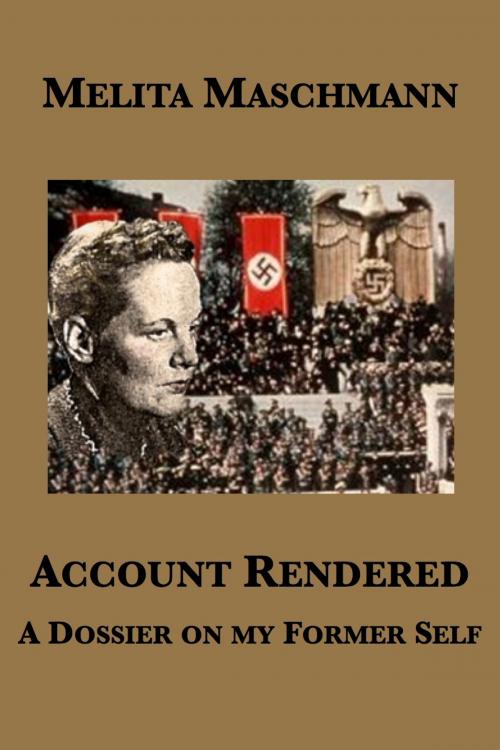Account Rendered: A Dossier on my Former Self
Nonfiction, History, Jewish, Holocaust, Germany, Biography & Memoir, Political| Author: | Melita Maschmann | ISBN: | 1230000121272 |
| Publisher: | Plunkett Lake Press | Publication: | April 11, 2013 |
| Imprint: | Language: | English |
| Author: | Melita Maschmann |
| ISBN: | 1230000121272 |
| Publisher: | Plunkett Lake Press |
| Publication: | April 11, 2013 |
| Imprint: | |
| Language: | English |
Account Rendered: A Dossier on my Former Self by Melita Maschmann (translated from the German by Geoffrey Strachan, with a new introduction and an afterword by Marianne Schweitzer Burkenroad with Helen Epstein; 98,000 words, 10 photographs)
Account Rendered was first published in Germany in 1963 as Fazit: Kein Rechtfertigungsversuch or Account Rendered: No attempt at justification. Maschmann wrote to Hannah Arendt that her intent in writing this memoir was to help her former Nazi colleagues think about their actions, and to help others “better understand” why people like her had been drawn to Hitler.
Written as a letter to an unnamed Jewish girl, this memoir details the trajectory of a socially-conscious, well-educated, middle-class girl as she joins the Hitler Youth, supervises the eviction of Polish farmers from their land and works in the high echelons of Nazi press and propaganda. Maschmann was arrested in 1945, at the age of 27, completed mandatory de-Nazification and became a freelance journalist.
This eBook edition includes a new introduction explaining how the Publishers identified Maschmann’s high school Jewish friend, Marianne Schweitzer Burkenroad, born in 1918 and now living in California. In an afterword, she recounts for the first time her friendship with Maschmann and her reactions to Account Rendered.
“[*Account Rendered* is an] important document of its time [...] I have the impression that you are totally sincere, otherwise I wouldn’t have written back to you.” — letter from Hannah Arendt to Melita Maschmann
“There weren’t a lot of books by former Nazis in the Sixties. I found in [Account Rendered] someone who had been overtaken by history, was struggling to make sense of what no longer made sense, and to understand why it had once done so. In other books, the Jews were an abstraction. For Maschmann, the Jews were neighbors and friends, which complicated the process of dehumanization that she participated in. The memoir seemed believable and honest in ways that other testimonies from the defeated did not.” — Arthur Samuelson, former Editor-in-Chief, Schocken Books
“Melita Maschmann’s candid [book], sub-titled ‘No attempt at justification,’ is a valuable study of the political seduction of youthful zeal” — Der Spiegel
Account Rendered: A Dossier on my Former Self by Melita Maschmann (translated from the German by Geoffrey Strachan, with a new introduction and an afterword by Marianne Schweitzer Burkenroad with Helen Epstein; 98,000 words, 10 photographs)
Account Rendered was first published in Germany in 1963 as Fazit: Kein Rechtfertigungsversuch or Account Rendered: No attempt at justification. Maschmann wrote to Hannah Arendt that her intent in writing this memoir was to help her former Nazi colleagues think about their actions, and to help others “better understand” why people like her had been drawn to Hitler.
Written as a letter to an unnamed Jewish girl, this memoir details the trajectory of a socially-conscious, well-educated, middle-class girl as she joins the Hitler Youth, supervises the eviction of Polish farmers from their land and works in the high echelons of Nazi press and propaganda. Maschmann was arrested in 1945, at the age of 27, completed mandatory de-Nazification and became a freelance journalist.
This eBook edition includes a new introduction explaining how the Publishers identified Maschmann’s high school Jewish friend, Marianne Schweitzer Burkenroad, born in 1918 and now living in California. In an afterword, she recounts for the first time her friendship with Maschmann and her reactions to Account Rendered.
“[*Account Rendered* is an] important document of its time [...] I have the impression that you are totally sincere, otherwise I wouldn’t have written back to you.” — letter from Hannah Arendt to Melita Maschmann
“There weren’t a lot of books by former Nazis in the Sixties. I found in [Account Rendered] someone who had been overtaken by history, was struggling to make sense of what no longer made sense, and to understand why it had once done so. In other books, the Jews were an abstraction. For Maschmann, the Jews were neighbors and friends, which complicated the process of dehumanization that she participated in. The memoir seemed believable and honest in ways that other testimonies from the defeated did not.” — Arthur Samuelson, former Editor-in-Chief, Schocken Books
“Melita Maschmann’s candid [book], sub-titled ‘No attempt at justification,’ is a valuable study of the political seduction of youthful zeal” — Der Spiegel















